28 Jun Pride Month: Making a Big Impact in a Small City
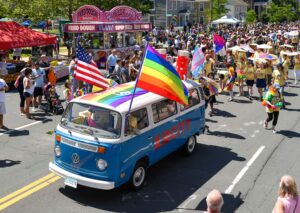 When I was asked to write an article discussing the concept of Pride and what it means, it was quite honestly a daunting task. I was confronted with a sizeable dose of imposter syndrome, because as the Assistant General Counsel for the City of Middletown, Connecticut—who only recently stepped into the shoes of Pride organizer—I acknowledge that there are (and have been) so many LGBTQIA+ activists and non-profit organizations locally, statewide, and across the country, who have been in the trenches advocating for the LGBTQIA+ community and fighting the good fight for decades longer than me. Once I worked through all of that, I began to think about the concept of Pride generally, and what it means to our local community, specifically.
When I was asked to write an article discussing the concept of Pride and what it means, it was quite honestly a daunting task. I was confronted with a sizeable dose of imposter syndrome, because as the Assistant General Counsel for the City of Middletown, Connecticut—who only recently stepped into the shoes of Pride organizer—I acknowledge that there are (and have been) so many LGBTQIA+ activists and non-profit organizations locally, statewide, and across the country, who have been in the trenches advocating for the LGBTQIA+ community and fighting the good fight for decades longer than me. Once I worked through all of that, I began to think about the concept of Pride generally, and what it means to our local community, specifically.
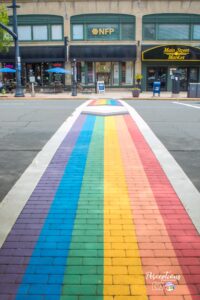 June 1st is the start of Pride Month, an internationally recognized month that is celebrated each year to honor the 1969 Stonewall Uprising in Manhattan, when people—particularly transgender women of color—fought back against the discrimination they faced from police officers at the Stonewall Inn, which was a refuge for LGBTQIA+ people. The Stonewall Uprising catalyzed the modern LGBTQIA+ rights movement and changed the nature of LGBTQIA+ activism. At its core, Pride Month is a protest and a demonstration to fight against the discrimination and violence that continue to face the LGBTQIA+ community. Pride Month is an opportunity for the community to gather together, honor the work of those who came before us, celebrate the progress that we have made, and be visible in our communities as our true and authentic selves. It is also a way for our allies to learn about the LGBTQIA+ community and show solidarity with us.
June 1st is the start of Pride Month, an internationally recognized month that is celebrated each year to honor the 1969 Stonewall Uprising in Manhattan, when people—particularly transgender women of color—fought back against the discrimination they faced from police officers at the Stonewall Inn, which was a refuge for LGBTQIA+ people. The Stonewall Uprising catalyzed the modern LGBTQIA+ rights movement and changed the nature of LGBTQIA+ activism. At its core, Pride Month is a protest and a demonstration to fight against the discrimination and violence that continue to face the LGBTQIA+ community. Pride Month is an opportunity for the community to gather together, honor the work of those who came before us, celebrate the progress that we have made, and be visible in our communities as our true and authentic selves. It is also a way for our allies to learn about the LGBTQIA+ community and show solidarity with us.
In 2019, I worked with the Mayor and the Common Council of Middletown, Connecticut, to create Middletown’s first Pride. Middletown is a community of almost 48,000 people located in Middlesex County, Connecticut. The work of creating Pride actually started in the spring of 2018, when I asked then-Mayor Daniel Drew to raise the Pride Flag at Middletown City Hall during Pride Month. It was a huge success and resulted in me being summoned to the Mayor’s office later that summer, where the Mayor informed me that he wanted the city to hold its very first Pride event the following summer. I immediately started brainstorming on how we could accomplish that goal, and one of my first decisions was to draft an ordinance that created the city’s first LGBTQ+ Advisory Committee. The intent was to give local LGBTQIA+ activists a voice in our city government, who could work with the city to make sure that Pride was an event organized by the LGBTQIA+ community. In February 2019, once the Committee was formed and had developed a framework for what would become known as Middletown Pride, I went before the city’s legislative body (the Common Council) to advocate for funding. After a three-hour public hearing, where I fielded numerous questions from councilmembers and many members of the public came out to support Pride, the appropriation was granted.
The rest as they say—is history. Once funding was secured, the city partnered with the Middlesex County Chamber of Commerce, Wesleyan University and the Triangle Community Center to create Middletown Pride. In June 2019, Middletown Pride held its first Pride event, and it was a monumental success that drew and estimated 15,000 people. Middletown Pride consisted of a Pride parade down the entirety of Main Street that lasted over an hour and a festival that was filled with vendors and hours of live-entertainment. Since then, the city’s Common Council annually provides funding for Middletown Pride, and numerous city departments—the Mayor’s Office, Public Works, Planning, Conservation and Development, Parking, the Police Department, and the Fire Department—work with me to make sure that Middletown Pride is held all over downtown Middletown each year during the month of June.
As the founder of a Pride event that just finished its third year, it is important for me that Middletown Pride not only continues to be impactful for the city’s LGBTQIA+ residents, but that it is able to increase its impact each year. In an attempt to accomplish this, one of the questions I find myself asking members of our community more than any other is, why is Pride important? The answers I receive differ based on a variety of factors, such as where that person lives, how much money they make, what portion of the community they identify with, what their lived experience has been, and how old they are. It is safe to say that Pride means many different things to many different people. So, instead of attempting to take a one-size-fits-all approach, I thought I would share what is important to Middletown Pride and to our local community.
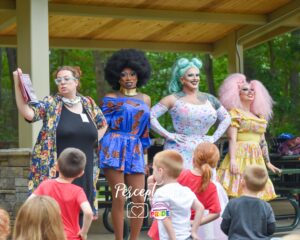 Pride is about visibility. In the immortal words of Harvey Milk, “we will not win our rights by staying quietly in our closets.” As a result, in creating Middletown Pride, one of our primary goals was to have the city create a visible and safe space for our LGBTQIA+ residents. It was paramount for the members of our community to have a space where they could safely gather in public and be seen and accepted as their true and authentic selves. In an attempt to create that space, the city hangs rainbow-colored banners reading “Middletown Pride” and puts up the Quasar Progress Pride Flag on every light pole on Main Street. These match perfectly with the city’s newly dedicated rainbow crosswalk and large six-foot tall letters spelling “PRIDE” that were erected in a city park. At Middletown City Hall, the city flies the Pride flag throughout Pride Month and raises the transgender flag in honor of the Transgender Day of Remembrance and in celebration of the Transgender Day of Visibility. This year, while we could not have our large in-person parade and festival that we did in 2019, Middletown Pride was able (for the first time) to offer in-person and virtual programming and events throughout the entire month of June, which included two days’ worth of concerts and live performances featuring local queer artists and drag performers; a Main Street cleanup event with a local business; submissions from individuals, businesses and politicians to create our first virtual Pride parade; a drag queen story hour event for queer youth and their families; and an in-person, outdoor Pride movie night. In response to Middletown Pride’s visibility efforts, people have shared with me that driving by the Pride flags improved their mental health and, by attending Middletown Pride, it was the first time they felt safe in their community.
Pride is about visibility. In the immortal words of Harvey Milk, “we will not win our rights by staying quietly in our closets.” As a result, in creating Middletown Pride, one of our primary goals was to have the city create a visible and safe space for our LGBTQIA+ residents. It was paramount for the members of our community to have a space where they could safely gather in public and be seen and accepted as their true and authentic selves. In an attempt to create that space, the city hangs rainbow-colored banners reading “Middletown Pride” and puts up the Quasar Progress Pride Flag on every light pole on Main Street. These match perfectly with the city’s newly dedicated rainbow crosswalk and large six-foot tall letters spelling “PRIDE” that were erected in a city park. At Middletown City Hall, the city flies the Pride flag throughout Pride Month and raises the transgender flag in honor of the Transgender Day of Remembrance and in celebration of the Transgender Day of Visibility. This year, while we could not have our large in-person parade and festival that we did in 2019, Middletown Pride was able (for the first time) to offer in-person and virtual programming and events throughout the entire month of June, which included two days’ worth of concerts and live performances featuring local queer artists and drag performers; a Main Street cleanup event with a local business; submissions from individuals, businesses and politicians to create our first virtual Pride parade; a drag queen story hour event for queer youth and their families; and an in-person, outdoor Pride movie night. In response to Middletown Pride’s visibility efforts, people have shared with me that driving by the Pride flags improved their mental health and, by attending Middletown Pride, it was the first time they felt safe in their community.
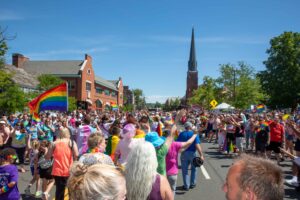 Pride is about protesting injustice and fighting for equality. The visibility that we have been able to achieve in just a few years has provided Middletown Pride with the ability to advocate for change on a local level. We are lucky to live in a state where our LGBTQIA+ residents are afforded more protection under the law than in other areas in the country. Even so, there are still too many places where members of the community lack protections for fundamental rights and dignity in housing, hospitals, schools, and public accommodations. The LGBTQIA+ community still faces targeted and disproportionate violence and discrimination, especially transgender people of color. Here in Middletown, we face the same challenges that other communities are facing, but we were recently able to create the city’s first LGBTQIA+ Commission[1], whose sole mission is to work with and advise the Mayor’s Office and our Common Council on how to structurally and fundamentally improve the lives of Middletown’s LGBTQIA+ residents. It is my hope that we can build on this progress to make real impactful and lasting changes on a local level.
Pride is about protesting injustice and fighting for equality. The visibility that we have been able to achieve in just a few years has provided Middletown Pride with the ability to advocate for change on a local level. We are lucky to live in a state where our LGBTQIA+ residents are afforded more protection under the law than in other areas in the country. Even so, there are still too many places where members of the community lack protections for fundamental rights and dignity in housing, hospitals, schools, and public accommodations. The LGBTQIA+ community still faces targeted and disproportionate violence and discrimination, especially transgender people of color. Here in Middletown, we face the same challenges that other communities are facing, but we were recently able to create the city’s first LGBTQIA+ Commission[1], whose sole mission is to work with and advise the Mayor’s Office and our Common Council on how to structurally and fundamentally improve the lives of Middletown’s LGBTQIA+ residents. It is my hope that we can build on this progress to make real impactful and lasting changes on a local level.
Pride is about education. In addition to visibility, one of Middletown Pride’s main focuses has been on education for both our LGBTQIA+ residents and for the community at-large. While the pandemic made planning Pride more difficult, it enabled us to offer diverse programming throughout the entire month of June to showcase and highlight a wide range of experiences that speak to the diversity of our community.
This year, Middletown Pride added to its membership and partnered with the Russell Library to coordinate several events for teens and adults with Q+ (a local organization that works with queer youth), organized a virtual panel of local transgender and intersex activists, and assisted a member of our LGBTQIA+ Commission to create a seminar about the history of Stonewall. Middletown Pride also worked with the first openly gay director of the Middlesex County Historical Society, who researched and taught a two-hour seminar on the history of the LGBTQIA+ community right here in central Connecticut, looking as far back as 1901. Additionally, this year the city is hiring the Triangle Community Center, an LGBTQIA+ organization that collaborates and assists with Middletown Pride, to provide mandatory training and education about LGBTQIA+ issues to the city’s entire workforce.
Middletown Pride also had the opportunity to work with Middletown High School’s Gay-Straight Alliance, which is a student-run organization that strives to promote education about the LGBTQIA+ community and create safe spaces in our schools. This year alone they have enacted remarkable change through education and activism. The Alliance created an educational video that explained what the acronym LGBTQIA stands for and how to be a good ally to the community all year round. They not only presented this video to their teachers and school administrators, but through Middletown Pride, they were able to present it citywide. They also successfully advocated before the Board of Education to create a gender-neutral bathroom at the high school.
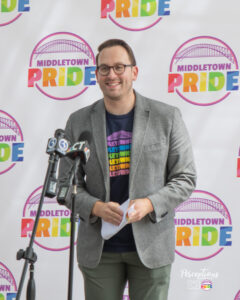 For me, Pride is about being able to be loved and accepted in your community. While I have faced discrimination, bullying, and hardships in my life, my privilege as a cis white gay man has allowed me to have an easier journey than most. Even still, growing up in a small town in Connecticut, I always dreamed of when I would be able to leave and move to a big city where I knew I would be accepted. My mission is to have Middletown Pride be a visible resource for our local LGBTQIA+ residents, so they know their city supports them and they don’t feel like they need to leave to be accepted. Looking back just a few years, I would never have expected to see rainbow flags flying all down Main Street, nor would I have foreseen that so many members of our city and state government would be actually disappointed—yes, disappointed—that the city could not hold an in-person Pride parade due to the pandemic.
For me, Pride is about being able to be loved and accepted in your community. While I have faced discrimination, bullying, and hardships in my life, my privilege as a cis white gay man has allowed me to have an easier journey than most. Even still, growing up in a small town in Connecticut, I always dreamed of when I would be able to leave and move to a big city where I knew I would be accepted. My mission is to have Middletown Pride be a visible resource for our local LGBTQIA+ residents, so they know their city supports them and they don’t feel like they need to leave to be accepted. Looking back just a few years, I would never have expected to see rainbow flags flying all down Main Street, nor would I have foreseen that so many members of our city and state government would be actually disappointed—yes, disappointed—that the city could not hold an in-person Pride parade due to the pandemic.
While the work is demanding and challenging, it has also been the most rewarding experience of my professional career. I have been given the opportunity to hear many heartwarming and empowering stories of how people’s lives have been impacted by Middletown Pride. One person shared their thanks for creating Middletown Pride because it makes them feel better about themselves, even though they are not comfortable coming out just yet. A local mental health professional told me that just by flying the Pride flags on Main Street, it resulted in the mental well-being of her LGBTQIA+ patients to be bolstered “across the board.” Another person decided to come out after her child came out to her, and they attended Middletown Pride (which was the first Pride they ever attended) together as a family. Finally, a teacher told me about one of her students, who previously had been suicidal, who was inspired to come out and had the courage to march down Main Street in the Pride parade.
As I said earlier, Pride means so much too so many. Being able to see and hear how Middletown Pride has actually improved the lives of the LGBTQIA+ people in my community is my answer to the question of why Pride is so important. Happy Pride Month, everyone.
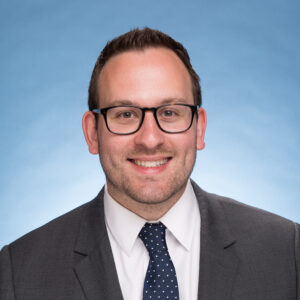 Christopher Forte has devoted his entire legal career to representing municipalities—and as Assistant General Counsel—provides legal representation to the City of Middletown in all practice areas, with a focus on general litigation, administrative law, land use, zoning, blight, municipal tax law and development. Attorney Forte has defended the City of Middletown successfully on several instances and has argued cases before the Connecticut Appellate and Supreme Courts. Attorney Forte has also taught courses on the First and Fourth Amendments at Northwestern Connecticut Community College as an adjunct professor. Attorney Forte is the creator and lead organizer of Middletown Pride, and is one of the first recipients of the International Municipal Lawyers Association’s Diversity, Equity, and Inclusion Award (2020).
Christopher Forte has devoted his entire legal career to representing municipalities—and as Assistant General Counsel—provides legal representation to the City of Middletown in all practice areas, with a focus on general litigation, administrative law, land use, zoning, blight, municipal tax law and development. Attorney Forte has defended the City of Middletown successfully on several instances and has argued cases before the Connecticut Appellate and Supreme Courts. Attorney Forte has also taught courses on the First and Fourth Amendments at Northwestern Connecticut Community College as an adjunct professor. Attorney Forte is the creator and lead organizer of Middletown Pride, and is one of the first recipients of the International Municipal Lawyers Association’s Diversity, Equity, and Inclusion Award (2020).
[1] In March 2021, the City of Middletown’s LGBTQ+ Advisory Committee was modified and expanded into the City’s first LGBTQIA+ Commission. The change was necessary because the Advisory Committee was created for one purpose only, to create Middletown Pride. After Middletown Pride was created and was successful, it became evident that the Committee had outgrown that singular purpose, and out Committee Members wanted the Committee to take a larger and more active role in the community. As a result, I proposed to the Mayor that the Advisory Committee be transformed into a Commission so that its mission could be expanded and its membership increased. The Mayor agreed, and I proposed another ordinance to the Common Council to effectuate this change, which was approved. The Commission now consists of 13 members (up from 9), including two members of the Common Council.



